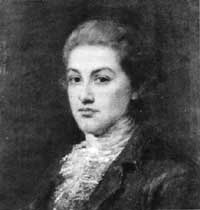







Biographical Sketches
|
THOMAS LYNCH, JR. South Carolina |
 Thomas Lynch, Jr. | |
| ||
The only son of Thomas Lynch, Sr., a rich rice planter, Lynch was born in 1749 at Hopsewee Plantation, located at Winyaw on the North Santee River in Prince George's Parish (present Georgetown County), S.C. After attending the Indigo Society School at nearby Georgetown, from 1764 until 1772 he studied abroad at Eton and Cambridge and read law in London. Upon his return home, deciding not to engage in the law, he married and settled at Peach Tree Plantation. A gift from his father, it was situated in St. James Parish (present Charleston County) on the South Santee River about 4 miles south of Hopsewee.
As the heir of one of the most fervent Revolutionaries and influential men in the colony, Lynch naturally took a deep interest in politics and enjoyed strong support from the electorate. During the years 1774-76, while his father served in the Continental Congress, he labored on the home front, attending the first and second provincial congresses as well as the first State legislature and sitting on the State constitutional committee.
In 1775, however, fate dealt Lynch a cruel blow. He accepted a captaincy in the First South Carolina Regiment of Continentals—to the dismay of his father who had hoped to use his position to obtain a higher rank for him. On a recruiting trip to North Carolina, young Lynch contracted bilious fever. This ended his military days and rendered him a partial invalid for his few remaining years.
Early in 1776 at Philadelphia the elder Lynch suffered a stroke that virtually incapacitated him for further public service. In the spring, his concerned colleagues in South Carolina elected his son to the Continental Congress, probably so that he could care for his father and act officially on his behalf. Although ill himself, Lynch made the onerous trip to Philadelphia. He stayed there throughout the summer, long enough to vote for and sign, at the age of 27, the Declaration of Independence. His father was unable to take part in the ceremony. The two were the only father-son team that served concurrently in the Continental Congress.
By the end of the year, the failing health of both men compelled them to start homeward. En route, at Annapolis, Md., a second stroke took the life of the senior Lynch. His son, broken in spirit and physically unable to continue in politics, retired to Peach Tree. Late in 1779 he and his wife, heading for southern France in an attempt to regain his health, boarded a ship bound for the West Indies that foundered. The couple died childless.
Drawing: Oil, 1875, by Anna Lea, after John Trumbull, Independence National Historical Park.
 |
 |
http://www.cr.nps.gov/history/online_books/declaration/bio29.htm
Last Updated: 04-Jul-2004